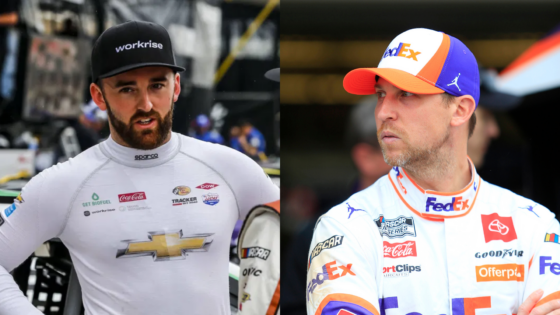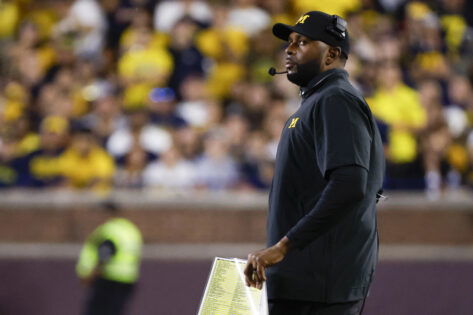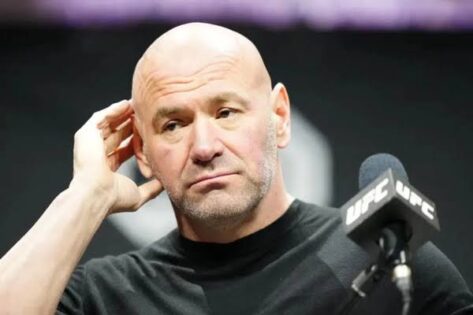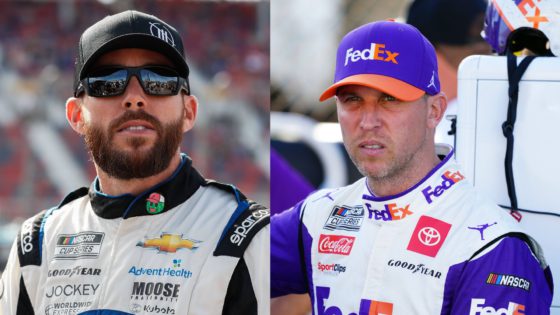Austin Dillon’s controversial victory at Richmond last year was nothing short of a Hollywood drama. On the final lap, with the race win and a spot in the NASCAR playoffs on the line, Dillon found himself in a frantic three-way battle for the lead. Instead of cleanly passing his rivals, he used his car like a battering ram, making contact with two other drivers, first Joey Logano and then Denny Hamlin, to send them spinning out of the way. Though he crossed the finish line first, his celebration was short-lived.
NASCAR, citing overly aggressive driving, took the unprecedented step of penalizing him after the race, revoking his eligibility for the playoffs. The incident sparked a massive debate among fans and racers alike about what constitutes “hard racing” and what crosses the line into dirty driving. Back then, Denny Hamlin had said, “We’re never ever going to get taken seriously as a sport because we have no real officiating.” Now, fast forward to 2025 at Richmond, and the story couldn’t be more different.
The memory of the previous year’s controversy hung in the air, but Austin Dillon was determined to write a new chapter. This time, there was no last-lap drama, no bumping, and no spinning. Instead, Dillon drove a flawless race, leading the final laps with a clean, strategic run, without a single controversial move. He completed his redemption arc in such great fashion that Hamlin couldn’t help but shower praise on the six-time Cup Series winner.
Hamlin discusses Dillon’s “unexpected winning” at Richmond
In a recent episode of his Actions Detrimental podcast, Denny Hamlin provided a candid, driver’s eye view into the weekend’s race, dissecting key moments and offering insights that went well beyond the official standings. While celebrating Austin Dillon’s pivotal victory and his subsequent securing of a playoff spot, Hamlin also delved into the performances of the race’s other major players.
The most stunning moment of the race for Hamlin was the unexpected victory of Austin Dillon. Hamlin highlighted the shock of the outcome, pointing out that Dillon had been languishing far down in the points standings before his win. He praised the #3 team’s strong execution, saying they “executed well” and “picked up right where they left off… in practice.”
While acknowledging their dominant performance, Hamlin, ever the competitor, expressed a professional’s skepticism at the idea that they were able to simply refine their previous year’s car setup, “I thought they were still strong, and so yeah, they took whatever setup they had last year and they just refined it a little bit and made it a little bit better and got another W,” a sentiment that revealed his own belief in the constant evolution required to win at the sport’s highest level. Hamlin then pointed out about unpredictability of the race and the surprise win. “You know well Austin wasn’t a bubble driver. He was 26 or 27th points or something going into this weekend. Yeah you would’ve had someone unexpected, either way, you would have someone unexpected winning this race.”
A significant portion of the discussion centered on the on-track frustration of Alex Bowman in the #48 car. Hamlin noted Bowman’s palpable discontent on the team radio, stemming from being held up in traffic. The culprit, Hamlin speculated, was Noah Gragson in the #4 car. Hamlin framed this event as a perfect example of racing’s unique form of karma, stating, “I guess one of the cars that was holding them up was the guy that he wrecked at Nashville.” This, he explained, is a key part of the “deposit and withdrawals” system in racing—when a driver causes a bad day for another, it’s “not a free incident,” and past actions often come back to influence a future race, whether intentionally or not.
Denny Hamlin changes his opinion on the ‘luck’ factor in NASCAR
The air at Richmond Raceway was thick with the memory of a past controversy. A year ago, this track was the scene of Austin Dillon’s hollow victory, a win secured with a last-lap pass, which ultimately led to him costing his playoff spot. The headlines screamed of chaos and controversy, and the racing world debated the role of “luck” versus “skill.”
Then came Denny Hamlin, the very driver who had been a victim of that last-lap chaos. A man who, in 2012, believed a championship was a delicate balance of 40% driver, 40% team, and a hefty 20% luck. But now, in the age of the Next Gen car, his perspective has shifted dramatically. He’d recently told The Athletic that luck’s role has diminished to a mere 10% for him. In his new formula, the driver’s skill was king, accounting for a massive 65% of the success. He said, “After thinking about it more, I believe these are the correct percentages in today’s world: driver 65 percent, team 25 percent, luck 10 percent.” This new philosophy was put to the ultimate test on a warm Saturday night in Richmond, which was a testament to Hamlin’s revised percentages.
While Dillon’s #3 team was flawless, their victory was a result of the driver’s sheer skill. Meanwhile, the mighty Joe Gibbs Racing (JGR) team, which had won 10 of the previous 18 Richmond races, seemed to be fighting against its own bad luck. Slow pit stops for Hamlin, a crash for Chase Briscoe, brake issues and penalties for Ty Gibbs, and a commitment line violation for Christopher Bell all conspired against them. They were the epitome of Hamlin’s 10% luck factor playing out in reverse.
In the end, Austin Dillon’s win proved that in the new era of NASCAR, the driver’s talent is the single greatest variable. Luck may still play a small part, but as Dillon showed, it’s no longer a prerequisite for success.
The post Denny Hamlin Heaps Praise On Austin Dillon After No. 3’s Richmond Redemption Silences Critics appeared first on EssentiallySports.



